Closure Of Borno IDP Camps Forcing More Children Out Of School
One implication of the state’s resettlement programme is that social amenities available in the closed camps, including free schooling and healthcare, have also ceased.
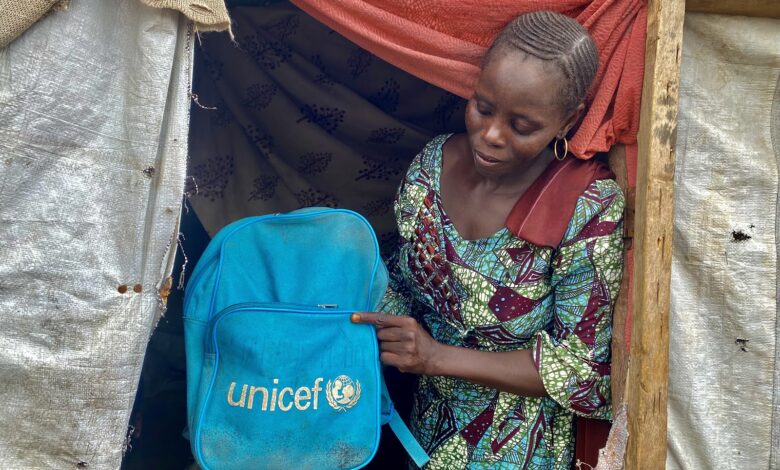
Young Bintu Yarima’s education came to a halt nine years ago when Boko Haram occupied her hometown, a place called Ala in the Marte area of Borno.
The terror group’s intentions were communicated clearly with its killing of over 20 teachers and clerics. The people escaped to Maiduguri, the capital of the Northeast Nigerian state, where they settled in the Bakasi displacement camp. At the camp, Bintu had a chance to continue schooling. But again, that ended last year when the state government shut it down. She was in JSS 3, the final year in Nigeria’s basic education system.
“There was no hunger, we had access to medical care, we went to school, we had access to water, and we were happily living,” she said about life at the IDP camp.
“We lost everything, especially access to the school, when the government shut down our camp and said we would be carried to our villages.”
Bintu’s family stayed back in Maiduguri, residing in a community along Dikwa Road. They believed their village was not safe to return to because of the presence of Boko Haram.
“The school we used to have is gone. In this place, no one is assisting us and our parents don’t have work to do. Most of the time, it is my younger ones and me that go and hawk in the streets to feed the house,” Bintu said.
Her mother, Yana, confirmed that her children had dropped out of school and blamed it on the government’s decision to shut down their camp.
“We don’t have what to eat; we cannot work. What do we do? Terrorists still occupy the villages where we used to farm. We cannot access farmland in the host community because it belongs to the locals here, and if you go to the bush to farm, Boko will kidnap you.”
Without money and a source of income, they would not be able to enrol their children in school, she added. “Who wouldn’t like their children to be educated? We want them to be educated so that they can help us.”
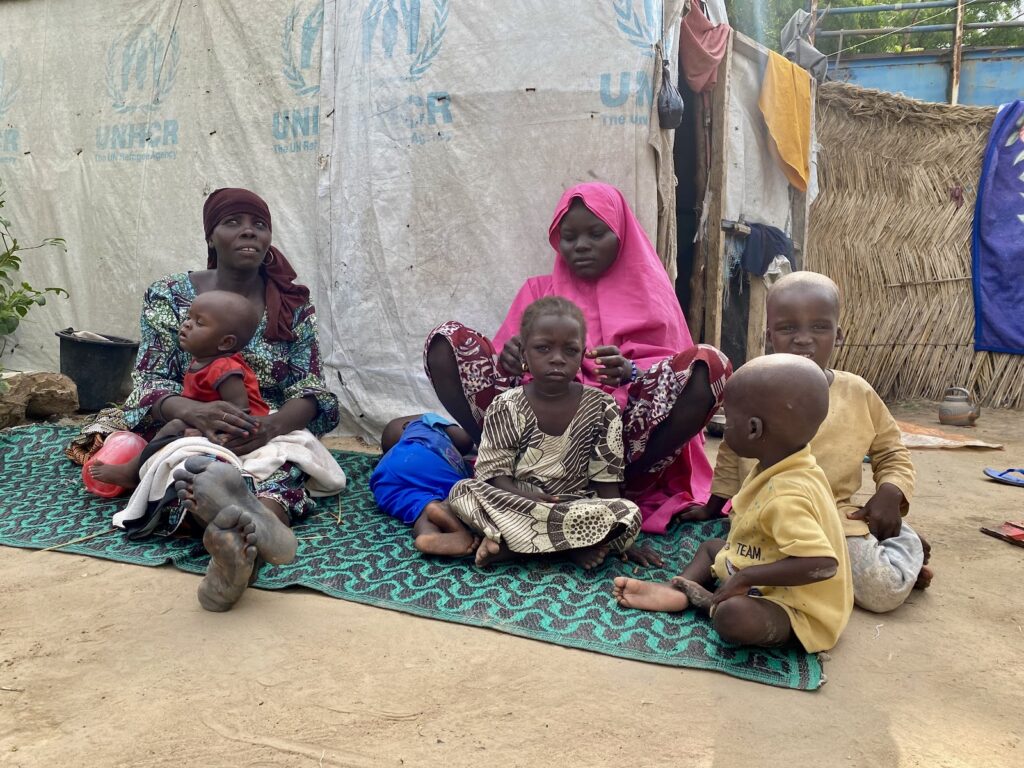
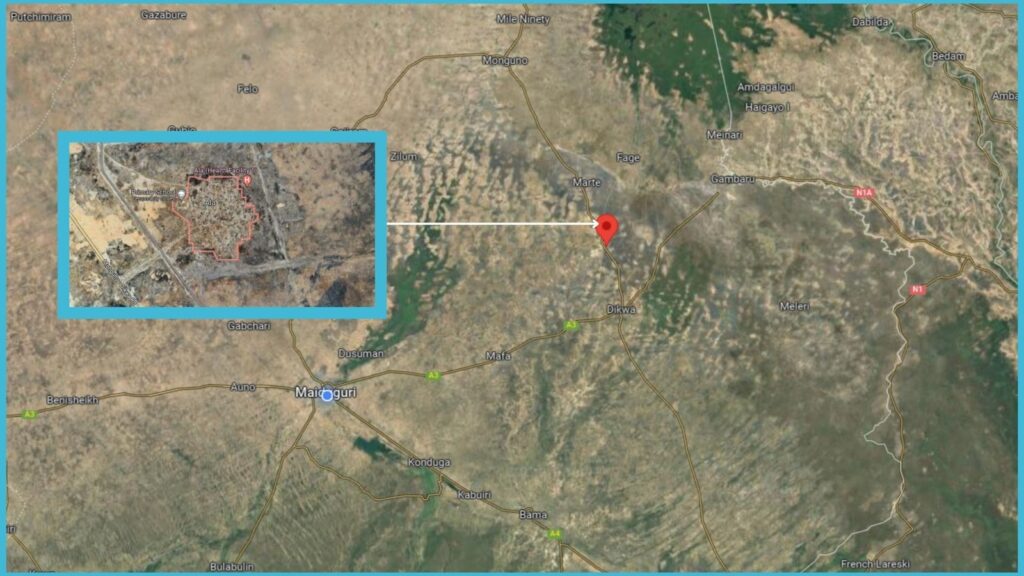
By the end of 2022, the Borno state government had closed nine formal displacement camps across the capital city as part of efforts to resettle displaced communities back or at least close to their ancestral towns.
The resettlement affected over 160,000 internally displaced people. The biggest camp in Maiduguri, Muna El-Badawi, which is home to over 51,000 thousand people, has also been marked for closure.
The government explained that, with the exercise, it hopes to build the displaced people’s resilience against aid, so “they and their children can achieve their high potential”.
Thousands of the IDPs at the camps, however, chose to remain in host communities inside and around Maiduguri, including places like Jere, Konduga, Gubio, and Mafa. Some returned to Maiduguri after visiting their communities and realising they were still not habitable.
One implication of the closures is that social amenities available in the various camps, including free schooling and healthcare, have also ceased.
As a result, many children have been forced to drop out of school, especially as their parents cannot afford to fund their studies.
In a survey conducted this year by the El-Kanemi Memorial Foundation (EMF), a non-governmental organisation based in Maiduguri, it found that there were over 40,000 out-of-school children in both displacement camps and host communities in Maiduguri and Jere. “In collaboration with LEA and SUBEB, we were able to start enrolling children back to school. We also offered training to teachers on psychosocial support and pedagogical approaches to ensure we enhance their participation in this act,” said the CEO, Abba Kyari Abatcha.
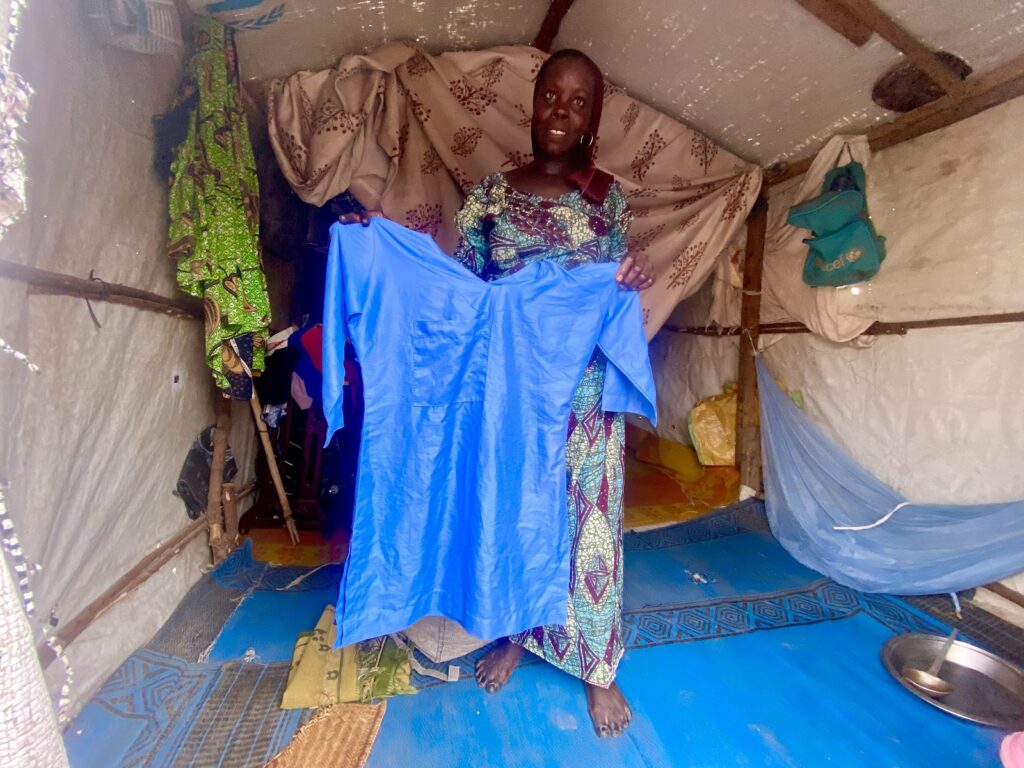
Interviews with multiple displaced families in Borno showed that most of them are struggling to meet their children’s educational needs in the face of other challenges.
All of Yana Abbaram’s 10 children have not been to school since their camp was closed. Every day, their priority is getting what to eat. The closest schools around them are privately owned and the fees, even for one child, are too expensive for them.
Living next to Yana is Falmata Rawana, who enrolled three of her six children at a government school after the camp was closed. But it was too far, and over time, they were forced to quit and join others searching for what to eat while caring for their younger ones.
“I love to see my children going to school,” Falmata appealed. “But this time around, it is impossible for me to manage the critical situation of hunger, distance, and lack of money to pay for school fees.”
Like other IDPs, Ibrahim Mohammed’s children attended school when the government camped them. It was the silver lining in the adversity they faced. He was grateful that, thanks to support from humanitarian organisations, his children received free education, books, and uniforms. It pains him that they no longer have this opportunity.
“My children stopped going to school the day our camps were shut down. We were re-displaced with ₦50,000 tokens and some foodstuffs that would last for a couple of weeks,” he said.
“I wish the education of my children would be taken care of instead of the little token we were given. I did not go to school. I wish my children would have gotten the opportunity, especially now that Boko haram is advocating for children not to go to school. We want to change the narrative.”
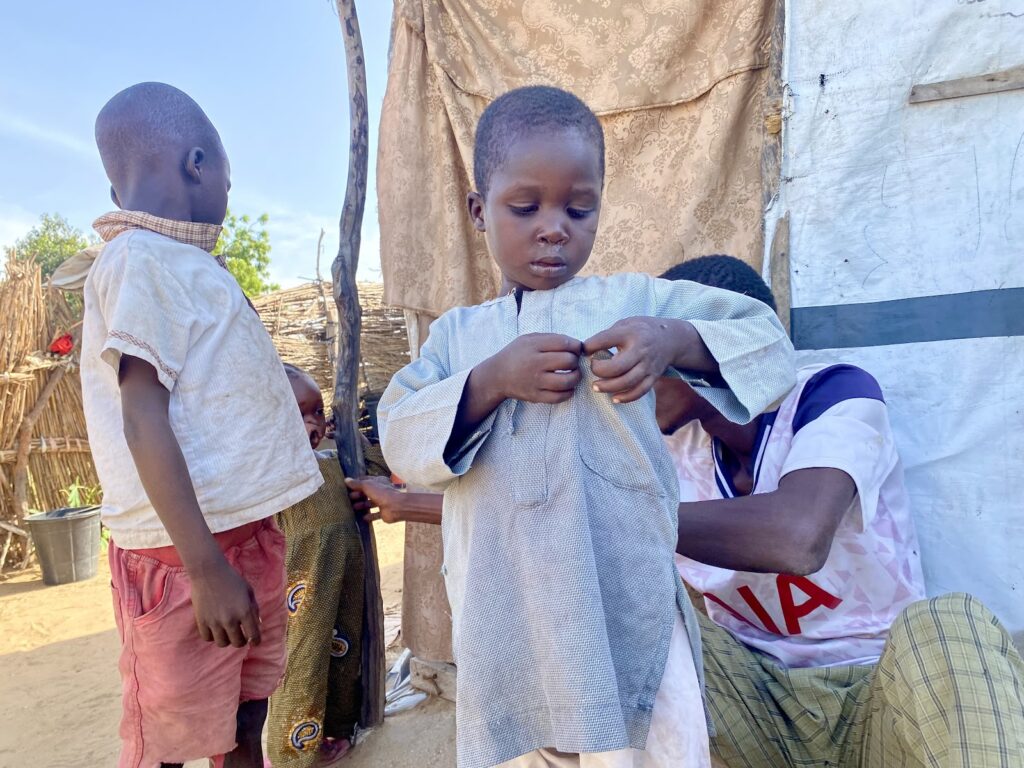
Before Boko Haram attacked his village and his family became displaced, Ibrahim had never imagined a day would come when his children would drop out of school. Now, not only are they not in school, they share in the burden of fending for the family of 10.
“Everyone has to contribute before we can get to eat, so the option of school doesn’t exist,” he said.
Ibrahim used to live in Kangarwa, a fishing village in Baga, near the shores of Lake Chad. He was a fisherman and a farmer, who enjoyed a peaceful life with his wife and children.
Four years ago, everything changed when Boko Haram gave him 24 hours to leave or be slaughtered. He left all he ever inherited and spent days in the bush before getting to Maiduguri. They joined thousands of other IDPs who sought refuge in Dalori I, one of the largest camps on the outskirts of Maiduguri.
Ibrahim has struggled to make ends meet. He works as a casual labourer and mason. A full day of labour would earn him ₦2,000 (less than $3), which is barely enough to feed his family of ten, considering a measure of maize, their staple food, costs ₦1,100 and can be consumed in one meal.
To supplement their income, Ibrahim’s children have to work as well. They hawk goods like water, groundnuts, sugar cane, or homemade sweets for children on the streets. They also run errands for people.
“Sometimes, I cannot even get a job that will provide a little change. Imagine I am at home by this time of the day,” Ibrahim said, pointing at his wristwatch, which showed it was 12 p.m.
He hopes he will one day be able to return to his home and rebuild his life, and that his children will resume classes. That’s all he ever wanted, he said.
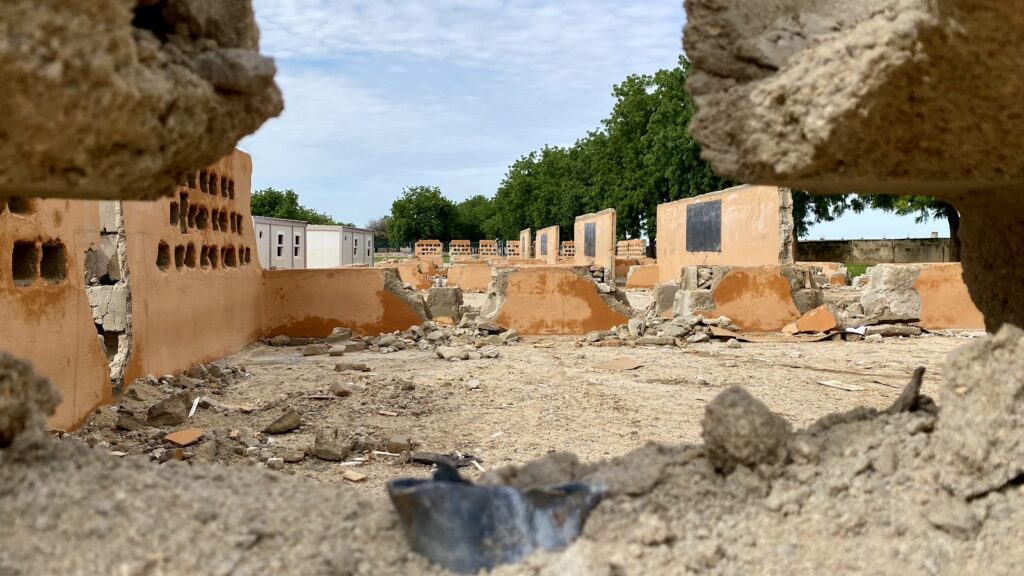
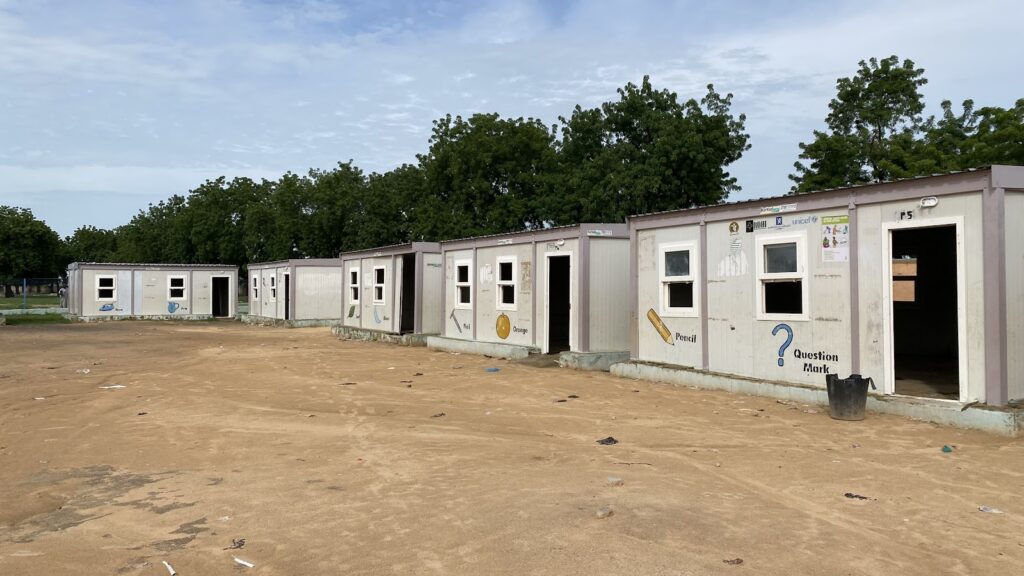
Many other IDPs who spoke to HumAngle shared similar experiences of having to prioritise survival over academic needs. You cannot go to school on an empty stomach, one of them proposed.
Amina Mohammed and Falmata Kolo said life was better in the camps. They kept hope alive and imagined that their children would be equipped for the modern world. But that hope was shattered when the camps were shut.
“We send our children to hawk to support the family; sending them to school means no food for the family, even though we can’t even afford to sponsor their school,” said Amina.
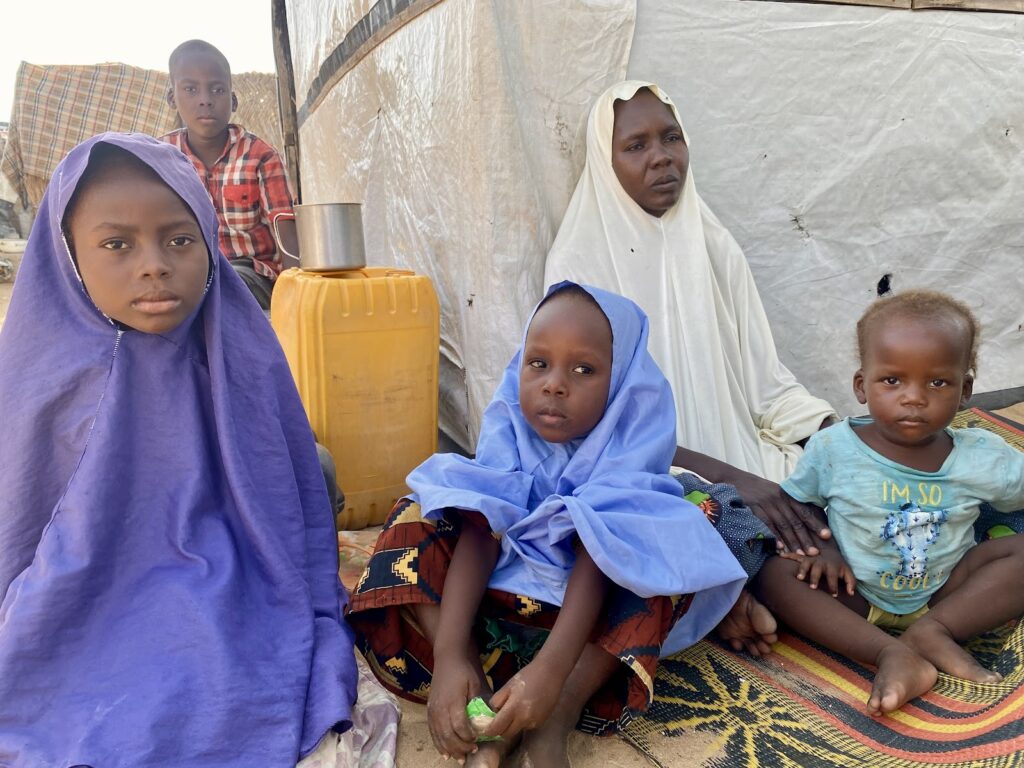
Recent visits to Ngurosoye in Bama and Kirawa in Gwoza revealed similar constraints for resettled IDPs.
Despite government provision of school buildings, the two communities lack functional teaching and learning environments. There is a lack of teaching materials, adequate teachers, and furniture. Lingering insecurity coupled with biting poverty and hunger have also made it difficult for children to stay in school.
Parents in Ngurosoye said their children are dropping out of school because they don’t get what they need.
Kirawa only has a primary school, and so children who have completed class six cannot proceed to higher levels.
Chakule Ibrahim, headmaster of Central Primary School in Kirawa, said it was renovated last year before their resettlement. “When we returned, it took us one week to enrol children into various classes and we were able to enrol 1,500 pupils in the school,” he said.
He added that they are facing a lot of challenges that are preventing the community from fully recovering.
“We have inadequate teachers, which is a result of the low turnout of teachers posted to teach here. They don’t want to come for many reasons. They complain about the lack of security and the accommodation to live with their families. You can see most of the buildings have been destroyed by insurgents, and many of them are owned by the teachers.”
HumAngle contacted the state Ministry of Education but was unable to get a comment for this report.
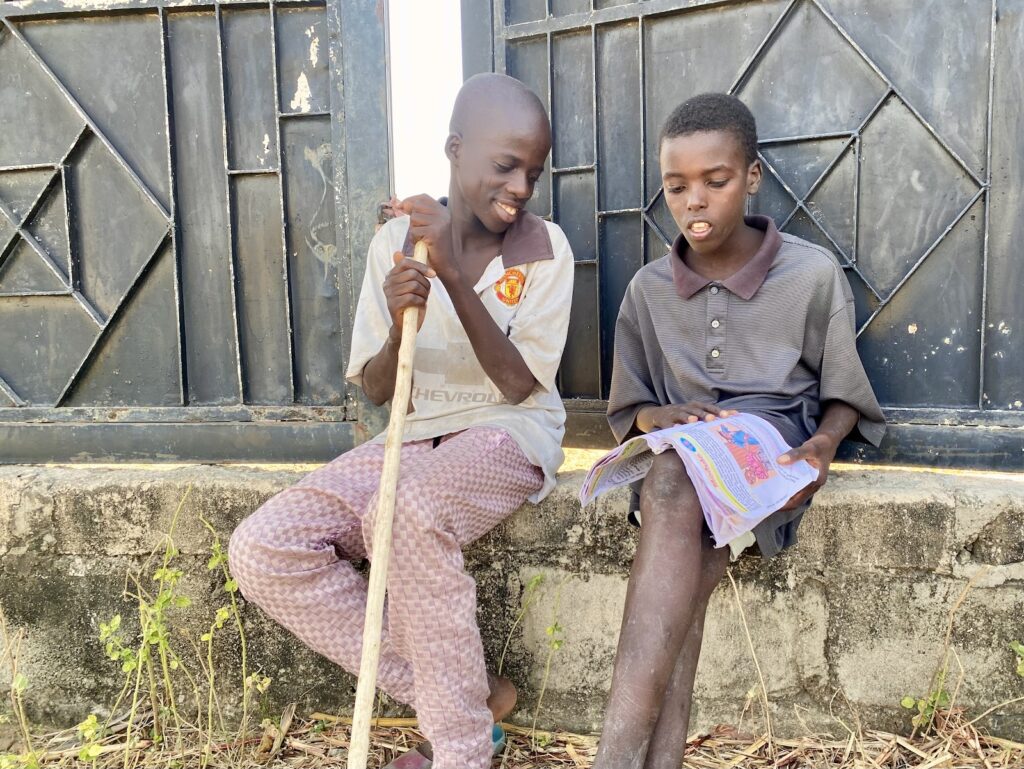
In 2022, Babagana Zulum, governor of Borno, announced the launch of the At Risks Children Programme (ARC-P) to provide mentorship for out-of-school children. The state government has recently built 24 ‘mega’ schools and rehabilitated scores of existing schools across the state to increase learning capacity. It has also announced exercises for the recruitment of thousands of new teachers.
However, many displaced children are not benefitting from these programmes, especially because of the distance to the schools and the economic crisis their families are facing.
Zarah Yusuf Ahmad, the executive director of Portrait of Lake Child Initiative (PLCI), said the disruption of the children’s education has a grievous impact on their future.
“A lot of the displaced children that drop out of school are in their early age of basic school year. When they return to their community or are re-displaced, they tend to drop out due to a lack of educational facilities close to them,” she said.
And even if a school is available, the parents often do not have the means to cater for their educational needs.
“Child labour, early and forced marriage for girls, premature sexual activity, early pregnancy, delinquency, crime, violence, substance abuse, and other social vices are significantly higher among dropouts,” Zarah told HumAngle.
Zarah urged that the government’s resettlement programme be strengthened to take various sectors into account.
“Most importantly, there should be an active sensitisation and awareness campaign on the importance of education and consequences otherwise.”
This report was facilitated by the Wole Soyinka Centre for Investigative Journalism under its Collaborative Media Engagement for Development, Inclusivity and Accountability Project.
Support Our Journalism
There are millions of ordinary people affected by conflict in Africa whose stories are missing in the mainstream media. HumAngle is determined to tell those challenging and under-reported stories, hoping that the people impacted by these conflicts will find the safety and security they deserve.
To ensure that we continue to provide public service coverage, we have a small favour to ask you. We want you to be part of our journalistic endeavour by contributing a token to us.
Your donation will further promote a robust, free, and independent media.
Donate HereStay Closer To The Stories That Matter




